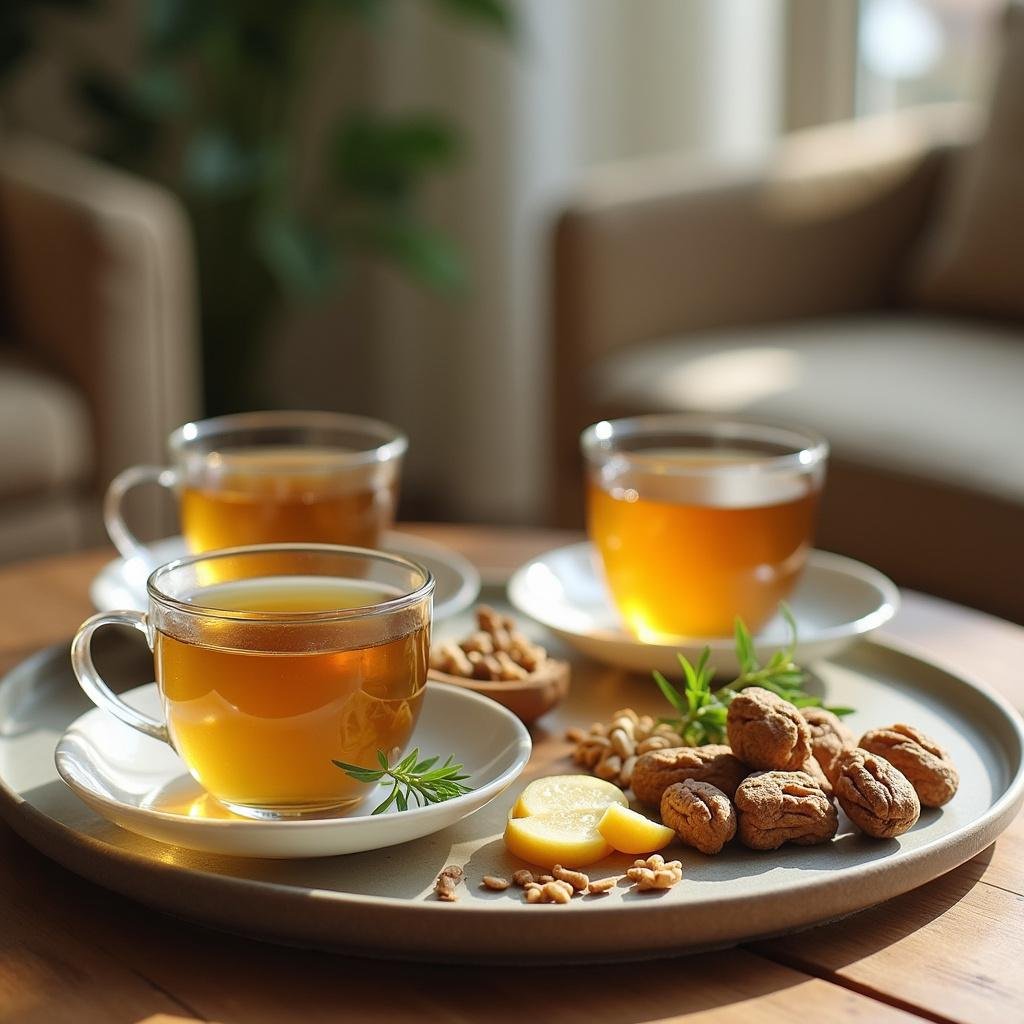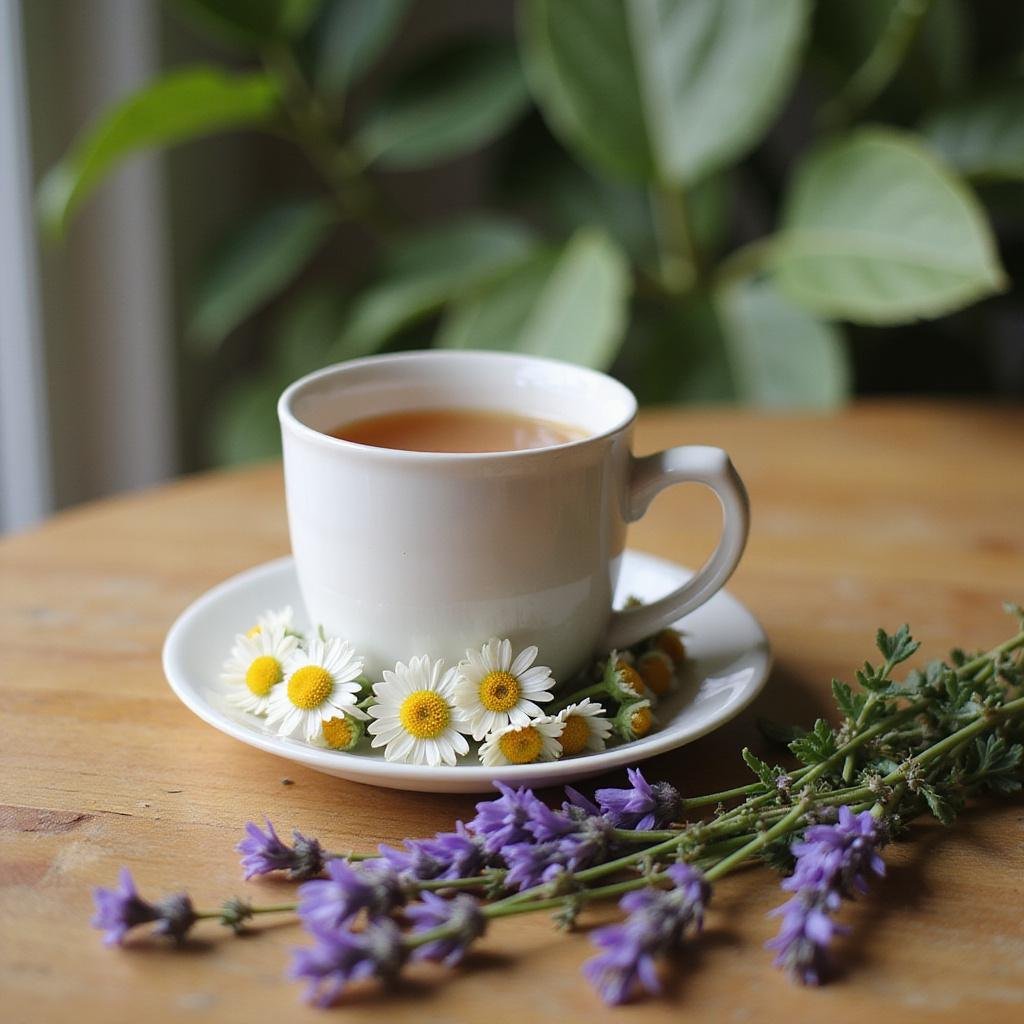1. Introduction
In today’s fast-paced world, managing stress effectively has become more important than ever. Chronic stress can lead to a variety of health issues, including anxiety, insomnia, and weakened immune function. Fortunately, nature provides us with powerful tools such as herbal teas and wholesome foods that can serve as natural stress relievers. Incorporating the best teas with foods for stress relief into your daily routine can significantly boost your ability to relax, enhance mood, and improve overall mental health. From soothing chamomile to invigorating peppermint, this article explores how to harness the calming properties of teas and complementary foods. For additional comforting strategies, check out [5 Cozy Meals for Hard Mental Health Days](https://mealsmom.com/5-cozy-meals-for-hard-mental-health-days/) and discover what I cook when I’m anxious at [What I Cook When I’m Anxious](https://mealsmom.com/what-i-cook-when-im-anxious/).
2. Why Tea and Foods Are Powerful Stress Relievers
Tea and foods for stress relief work harmoniously to modulate your nervous system, balance hormones, and clear your mind. Many teas contain natural compounds like antioxidants, polyphenols, and herbal extracts that have been used for centuries to promote relaxation. Simultaneously, nutrient-dense foods supply essential vitamins and minerals such as magnesium, vitamin C, and B-complex vitamins that support brain health and reduce anxiety levels. Combining these soothing beverages with nourishing foods creates a holistic approach to stress management, helping your body and mind build resilience against daily pressures. Using tools like a high-quality loose leaf tea set or herbal infusions from trusted sources can elevate your relaxation routine significantly.

3. Top Teas for Stress Relief
Selecting the right tea can greatly amplify your stress reduction efforts. Here are some of the most effective options to consider:
Chamomile Tea: Nature’s Calming Herb
Chamomile is widely recognized for its gentle sedative properties and ability to ease anxiety. This calming herbal tea contains flavonoids that soothe the nervous system and promote restful sleep. Drinking chamomile tea before bed not only enhances sleep quality but also provides a natural way to unwind after a stressful day. Incorporating high-quality chamomile tea bags or loose leaves from trusted brands can make a noticeable difference in your relaxation routine. Want to deepen your calming experience? Consider adding a dropdown of honey or lemon, or explore herbal infusions like valerian root or lemon balm for extra tranquility.
Green Tea: A Natural Mood Booster
Green tea is rich in the amino acid L-theanine, which promotes relaxation without drowsiness. This compound helps increase alpha brain wave activity, leading to a calm alertness that can enhance focus while lowering stress hormones. Regularly enjoying a cup of green tea can elevate your mood and mental clarity, especially when paired with mindful breathing exercises. For optimal health benefits, opt for organic green teas or matcha powders, which deliver concentrated antioxidants that support overall well-being. Consider adding a few drops of essential oils like bergamot for an aromatic uplift during your tea sessions.
Lavender Tea: Aromatic Stress Relief
Known for its fragrant aroma, lavender also offers potent calming effects. Lavender tea can reduce feelings of tension, promote relaxation, and alleviate symptoms of anxiety. Its soothing properties make it an excellent choice after a hectic day or during moments of overwhelm. To maximize benefits, choose high-quality lavender herbal blends or dried lavender flowers, and serve with a touch of honey or fresh mint. For an enhanced sensory experience, surround yourself with lavender-scented candles or essential oils during your tea time.
Peppermint Tea: An Energizing Calm
Peppermint tea provides a refreshing and invigorating way to release muscle tension and refresh the mind. Its cooling aroma can help reduce headaches and ease digestive discomfort linked to stress. Sipping peppermint tea during breaks can restore mental clarity and boost your mood, especially when facing multitasking or fatigue. Ensuring you have a good quality peppermint tea leaves or tea bags from trusted brands can intensify this calming experience. For an extra rejuvenating effect, try adding slices of fresh ginger or a splash of lemon.
4. Foods That Complement Your Stress-Relief Teas
The right foods can enhance the calming effects of your favorite stress-relief teas. Consuming nutrient-rich snacks alongside tea creates a nurturing environment that supports emotional balance and relaxation. Incorporate these foods into your daily routine for the best results:
Nuts and Seeds: Rich in Magnesium
Almonds, walnuts, sunflower seeds, and pumpkin seeds are excellent sources of magnesium—an essential mineral that helps regulate stress hormones and promotes muscle relaxation. A handful of raw or lightly roasted nuts combined with a warm cup of herbal tea provides a perfect pairing for calming the nervous system. Magnesium supplements or magnesium-rich foods are often recommended to reduce anxiety, especially when combined with relaxation techniques.
Fresh Fruits: Natural Mood Enhancers
Fruits like berries, oranges, grapefruits, and apple slices are packed with vitamin C and antioxidants that help fight oxidative stress. Their natural sweetness complements herbal infusions, making your stress-relief routine both tasty and healthful. Incorporate citrus slices into your tea or enjoy a fruit platter alongside your favorite herbal brew for a mood-boosting snack.
Dark Chocolate: A Comfort Food
Dark chocolate contains theobromine and phenylethylamine—compounds linked to improved mood and reduced stress hormones like cortisol. Enjoying a small piece of high-quality dark chocolate (70% cacao or higher) with your calming tea not only satisfies sweet cravings but also offers mood-enhancing benefits. Look for ethically sourced options to ensure quality and ethical standards.
Whole Grain Snacks: Sustained Energy
Whole grain crackers, oats, or toast support steady blood sugar levels, helping prevent mood swings associated with stress. These snacks provide sustained energy and pair beautifully with herbal teas such as chamomile or lemon balm. Choosing minimally processed, high-fiber options from reliable brands will help you maintain a calm and balanced state throughout the day.
5. How to Prepare Your Stress-Relief Tea and Food Combination
Creating a calming ritual involves selecting your favorite stress-reducing tea and pairing it with nourishing foods. Here’s a simple step-by-step guide:
- Choose a soothing herbal tea like chamomile, lavender, or peppermint from reputable brands or local health stores.
- Steep the tea using filtered hot water for the recommended duration—typically 5-10 minutes for maximum herbal extraction.
- Arrange healthy snacks such as mixed nuts, fresh fruit slices, or a small dark chocolate bar on a serving tray.
- As you sip your tea, focus on your breathing, the aroma, and the taste of your food to create a mindful experience that enhances relaxation.
This mindful practice can be incorporated into your daily routine, helping to significantly lower stress levels and promote emotional well-being.
6. Additional Tips for Stress Management
While enjoying herbal teas and nourishing foods plays a crucial role, combining these habits with other effective stress management techniques creates a more resilient mind-body connection:
- Practice deep breathing exercises or meditation for at least 10 minutes daily to foster calmness.
- Engage in physical activities such as walking, yoga, or tai chi, which are proven to reduce stress hormones.
- Prioritize quality sleep each night to support emotional balance and mental clarity.
- Limit intake of caffeine, processed foods, and alcohol, which can exacerbate anxiety and stress symptoms.
7. Frequently Asked Questions (FAQs)
What are the best teas for reducing stress and anxiety?
The top teas known for their calming effects include chamomile, lavender, green tea, and peppermint. These herbal and green teas contain natural compounds that help relax the nervous system and promote mental calmness. For additional options, try ashwagandha tea or passionflower herbal infusions.
Which foods should I combine with stress-relief teas for maximum effect?
Nuts high in magnesium, vitamin C-rich fruits, dark chocolate, and whole grains are ideal pairings. These foods support your nervous system, stabilize blood sugar, and work synergistically with herbal teas to enhance relaxation.
Can drinking tea regularly improve my overall stress levels?
Absolutely. Regular consumption of calming teas, alongside a balanced diet and stress management practices, can lead to decreased baseline anxiety and improved emotional resilience over time. Incorporating a variety of herbal teas into your routine can be a game-changer.
Are there any precautions I should take when using herbal teas for stress relief?
Yes. While herbal teas are generally safe, consult with a healthcare provider if you are pregnant, nursing, or taking medications, as some herbs may interact or cause allergies. Always choose high-quality products from reputable sources and monitor your body’s response.
8. Conclusion
Integrating the best teas with foods for stress relief into your daily lifestyle offers a natural and enjoyable way to combat anxiety and promote relaxation. Whether it’s the soothing aroma of lavender or the calming effects of chamomile, pairing these herbal infusions with nutritious snacks delivers a comprehensive approach to stress management. Remember, consistency is key—making these practices a part of your routine can lead to lasting benefits. For more personalized stress-relief strategies, explore additional resources and create a calming environment that nurtures your well-being every day.

